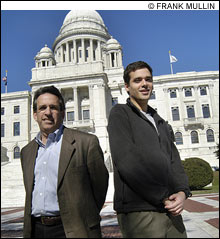
NEW FACES: Candidates Miller and Segal are like to lend more support to liberal causes. |
To the displeasure of progressives around Rhode Island, the Democrat-controlled General Assembly this year passed mammoth tax cuts for the wealthiest of Rhode Islanders — the same kind of tax cuts for which national Democrats have hammered President George W. Bush. In response, progressives around the Ocean State worked hard and won two important victories, the Democratic primary wins in September of Josh Miller, the owner of Trinity Brewhouse, in Senate District 28, and the victory in House District 2 of outgoing Providence City Councilor David Segal. These wins provided a burst of hope for Rhode Islanders seeking more progressive voices in the 38-member Senate and the 75-member House — which despite being overwhelmingly Democratic, tend to be socially conservative.
The nascent legislative Progressive Caucus, which began organizing only last year (on the heels of the tax cuts debate), in an attempt to infuse more liberalism and social justice into legislative proposals and debates, stands to benefit.
A robust Progressive Caucus can potentially offer stronger opposition to Republicans and conservatives by introducing new and innovative policy solutions to the bread and butter issues, like high taxes, high energy prices, and poorly performing schools, that face Rhode Islanders. This opposition would contrast with the Democratic legislative leadership’s current modus operandi of taking Republican ideas, like tax cuts for the rich, pension cuts, and corporate handouts, and making them their own.
While the primaries provided a spark of hope, the November 7 general election, with a handful of newcomers seeking to join incumbent progressives, is equally important. Here’s a look at the key races and at what increased progressive political power would mean for Rhode Island
For what do progressives stand?
Progressive politics and liberal politics seem to be used interchangeably these days, but “progressive politics” is seen to be on the left side of the Democratic Party, or, as Howard Dean famously asserted in his 2004 presidential campaign, the “Democratic wing of the Democratic party.”
Segal, who in 2002 became the first Green Party member to win elective office in Rhode Island, sees progressive politics as fighting for “equal opportunity — the non-exploitation of those who are vulnerable by those who are powerful. Looking for spots in which we can empower people, and make the structures that define our society, like government, workplaces, a little more democratic.”
Last year, during the legislative debate for tax breaks for the rich, state Representative Art Handy (D-Cranston) began to organize meetings of the Progressive Caucus, a small group of eight to 10 progressive representatives and senators. While they only met about a half-dozen times, Handy calls it a strong beginning, and he hopes for more activity and a more unified legislative agenda in the next legislative session.
This caucus is important because of the strong influence of corporate and conservative voices in the General Assembly. As Marti Rosenberg, the leader of the Progressive Leadership Fund, a liberal political action committee, points out, “With the down-sizing of the legislature in 2002, there are simply fewer progressive people up in the Assembly to carry progressive messages, and every time we elect a new progressive to office, we significantly expand the opportunities for progressive viewpoints to be expressed: in meetings, hearings, floor debate, and leadership discussions.”